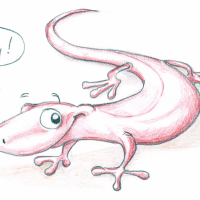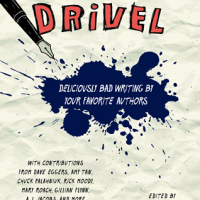Hear ye! Hear ye! The Surgeon General recommends you take a daily dose of literary fiction whether you like it or not!
“For Better Social Skills, Scientists Recommend a Little Chekhov,” reads the headline of an October 4, 2013 New York Times article. Scientists find literary fiction improves readers’ abilities to feel empathy, perceive social situations, and respond with higher emotional intelligence.
Apparently, “popular” fiction (implying that literary fiction isn’t popular) and “serious nonfiction” create no beneficial effect. To be fair, the article points out that “serious nonfiction” was not of the “All the President’s Men” variety but more along the lines of “How the Potato Changed the World.”
My thoughts?
First, what about poetry, eh??? Not even on the study’s radar.
Second, reading is good for you, period, but that needn’t be the reason to do it. Especially since, just like broccoli, flossing, and exercise, people will subconsciously avoid literary fiction precisely BECAUSE they now know it’s good for them!!
Here’s what the scientists didn’t tell you: woohoo!!!—reading genre fiction is just like doing crack or crystal meth and should be labeled with government warnings like:
“Side effects include failure to eat, sleep, or converse with one’s family, resulting in weight loss, workplace narcolepsy, and social isolation. In severe cases, starvation, coma, and death.“
I know this. My chronically sleep-deprived husband can’t put down the latest sic-fi even if it’s 3:00am. Give him some James Joyce, Toni Morrison, or Richard Ford, and he’s down for the count.
But instead of feeding our cravings, the authors of this study want us to willingly take a daily dose of literary fiction so we’ll become emotionally smarter. Wouldn’t that be a shot in the arm for the literary fiction publishing industry?!
I WANT to believe everyone enjoys litfic as much as I do, but apparently my “literary brain” isn’t wired like test subjects’ brains. The article quotes participants as saying they don’t enjoy reading literary fiction as much as popular fiction. It’s the Kiss of Death, the equivalent to saying they don’t like broccoli as much as chocolate (although dark chocolate is good for you unless you’re a dog–sorry Dogpatchers–or have Meniere’s disease, like me).
I think we should pay attention to this comatose literary canary, the one that’s getting dangerously close to expiring in the mine of irrelevance. But first, we pause for an, um, defining moment.
The all great and powerful Wikipedia describes the differences between literary and genre fiction:
Literary – serious, complex, focusing on inner character aspects, and quotes Terrence Rafferty saying “literary fiction, by its nature, allows itself to dawdle, to linger on stray beauties even at the risk of losing its way.”
Genre – more plot driven, focusing more on the “social and material complexities of the object” rather than the subject.
Hmmmm. Should literary fiction strive to remain relevant by making sure there’s a plot somewhere in that tangle? The element that serves to propel readers forward, so when they reach the last page they say, “Man, was that ever a good read!” And in the process, we needn’t sacrifice nuance or good writing, right?
I’m thinking of a book by Andrew Pyper that I recently read and reviewed, called The Demonologist. It was well written, thought-provoking, and a real page-turner. I enjoyed it.
But on the other hand, my favorite books of all time include Faulkner’s The Sound and the Fury and Absalom!Absalom! That pair invaded my dreams, while The Demonologist just left me looking over my shoulder at night.
And I think it’s because my “brain on Faulkner” spent so much time making sense of the text. You see, the brain, similar to a heat-seeking missile, is not content until it hits its target, finding a pattern of meaning in random chaos.
For those who’ve read The Sound and the Fury, all I need to say is “Caddy smelled like trees.” (Those of you who haven’t, sorry.) As we make our way through the narrative, we begin to understand the significance of Benjy’s repeated observation. So if an author tells a story using dreamlike elements (stream of consciousness, e.g.), it make sense for the brain to work at understanding the narrative when it’s in a dream state.
I can’t recall where I read or heard this recently, but I believe that by the time children turn five years of age, they have already absorbed the pattern of their culture’s storytelling. So if the brain is given a pattern it’s seen before, it slips easily into the pattern and slides along for the ride. Is this the particular craving, a path of least resistance, that genre fiction feeds?
So my question is this: Should an author aim for writing a complex, nuanced, character-driven, well-plotted story that doesn’t get lost in the weeds of “stray beauties”?
Or maybe the question is, shouldn’t we seek variety in the books we read? Or maybe, is it wrong to ask one book to be our everything? Is it too exhausting and self-defeating for an author to strive for this high bar?
Can you hear the panic in my voice?






















Nice post. I have to say I equate genre fiction to fast food–gotta love it sometimes, it fills you up, but it’s also generally forgettable and frequently regrettable at least from your colon’s standpoint, whereas, to use your example, who can forget what Caddy smells like? The stories that can operate on multiple levels are certainly the ones that stick with us. But if a reader has a steady diet of “fast food” and never acquires a taste for delicacies, here’s to dragging them kicking and screaming to the sushi bar. It’s for their own good.
I can see that you’re firmly inside the “get your dog its vaccinations” camp. So am I, but I get the feeling that many a dog will be spread-eagled across the door, refusing to enter the inner sanctum of the literary vet’s office.